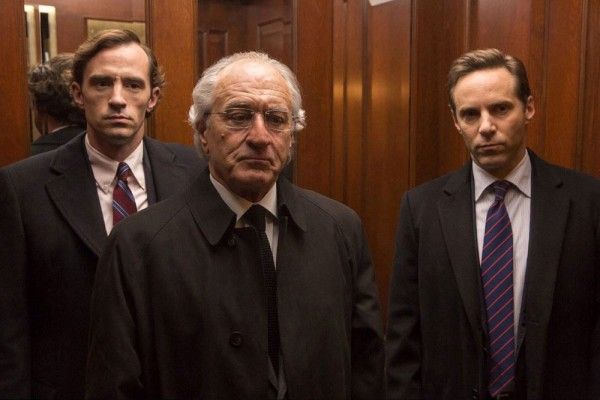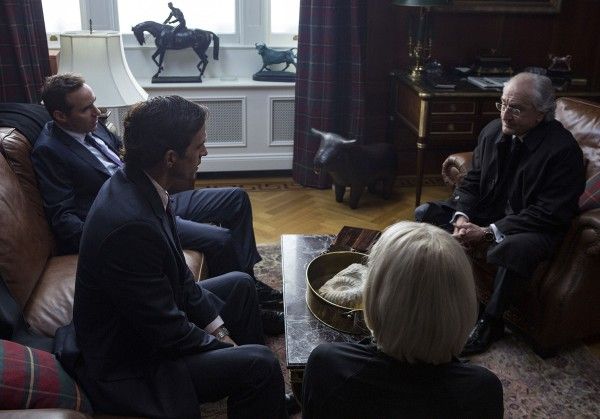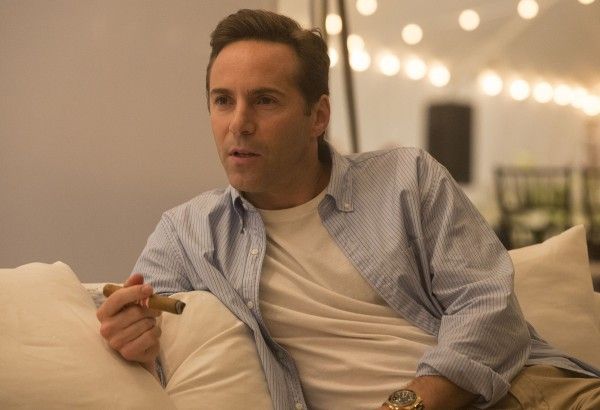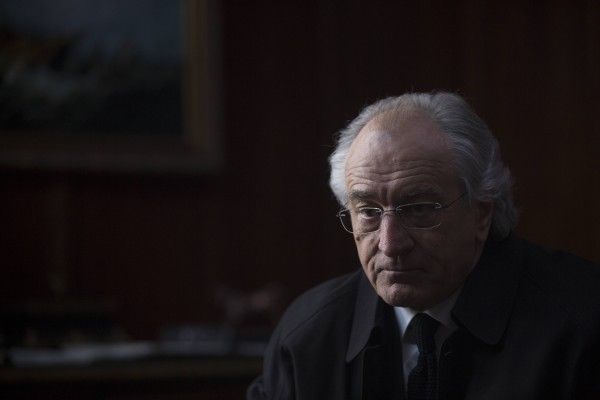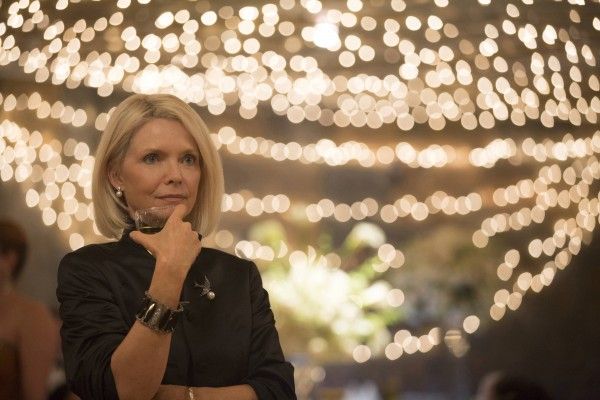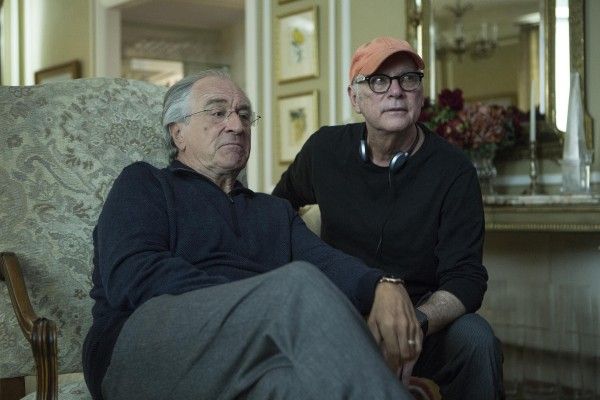Directed by Barry Levinson and based on the book written by Diana B. Henriques, HBO Films’ The Wizard of Lies examines Bernie Madoff’s Ponzi scheme, and the deception, lies and cover-up that came, as a result. While Bernie (Robert De Niro) made headlines around the world, upon his arrest for what is perhaps the largest financial fraud in U.S. history, his wife (Michelle Pfeiffer) and sons (Alessandro Nivola, Nathan Darrow) were placed directly into a harsh, unrelenting and unforgiving spotlight that permanently tore their family apart.
During this 1-on-1 phone interview with Collider, actor Alessandro Nivola talked about how the Madoff family presented a closeness to the public that wasn’t necessarily the case in private, how Bernie Madoff could have possibly expected to get out of what he caused, having Robert De Niro and Michelle Pfeiffer play his parents, adjusting to Barry Levinson’s directing style, and having a resource like Diana Henriques on set (she’s also in the film). He also talked about signing on for Red Sea Diving Resort, his desire to work with writer/director Gideon Raff, and what he liked about the script.
Collider: How challenging was it to help bring the Madoff’s to life, when they’re such an internal family who doesn’t express their emotions too well?
ALESSANDRO NIVOLA: You’ve got a point. It’s such a strange thing because the family. On the one hand, was so close, by all accounts, really intensely loyal to one another and, at times, deeply loving of each other. And then, in particular, Bernie and Mark’s relationship had this palpable abuse. To have those two things exist, side by side, is very human, but also fascinating and kind of horrifying.
It’s so interesting that, for a family that everyone thought was so close, they didn’t seem to really know each other, at all.
NIVOLA: I know! That’s always the fear, that the people that you’re closest to, you don’t actually really know. People who get divorced often say that. That’s not uncommon. Especially when you’re talking about somebody who really had compartmentalized his life in the way Bernie had, in such a way that the two sides just didn’t touch, of course it would be easy to think that you knew a certain person that you had grown up with, and then discover that he wasn’t who you thought he was. I did feel that it was important to also get across the way that Mark idolized his father and adored him. That ultimately ended up being the source of all of his rage towards him. All his life, he felt that he could never really quite live up to his father’s legacy.
Watching a story like this, it makes you wonder what Bernie Madoff thought would happen, if he got found out?
NIVOLA: Bernie said, later on in one of his interviews, that it got to the point where he was longing for the world to just explode, so that he and everything else would just disappear. That was the only way that he could imagine the whole thing being resolved. I think that makes total sense. If you’ve gotten to that point, where there’s no way out of something that is so catastrophic like that, it’s better to just disappear in a puff of smoke rather than have to go through the whole process of reckoning with it and having to confront all of it, which he continues to avoid doing. I would probably feel the same way.
When this came your way, did you know that Robert De Niro would be playing Bernie Madoff and that Barry Levinson would be directing?
NIVOLA: The way it was presented to me was, “How would you like to play Robert De Niro’s son in a movie?” That was all I needed to hear. I think he’s one of the greatest actors of all time. In my opinion, even more so for having reinvented himself as a comedian, half-way through his career. I think he’s just one of the all-time greats, so the opportunity to work with him was a dream. I didn’t really know that much about the sons. I knew about the Ponzi scheme, but I didn’t really know much about Mark and what that story was. It was only after I’d had the chance to meet De Niro and come onto the project that I really started to be drawn in and fascinated by Mark’s complex psychology and the relationship that he had with his father, in particular. It was knowing that I was going to be in this movie, where most of the scenes involved the two of us, that was thrilling.
What was it like to then find out that Michelle Pfeiffer would be playing your mother?
NIVOLA: I couldn’t believe that she was old enough. She still seems so young and beautiful. They made her up to look so much like Ruth, but she’s still just totally gorgeous. I’d never met her before, but De Niro and I had both worked on American Hustle. We didn’t have any scenes together, so it was heartbreaking for me to have brushed by him and never had the chance to face off together. So, this seemed like the opportunity to fix that.
Bernie Madoff’s crime taught me what a Ponzi scheme is. I know he’s not the first one to pull one off, but it was the first time I had been made aware of what that is because he did it on such a huge scale. I also remember going through those thoughts of, “There’s no way his wife didn’t know. There’s no way his sons and his brother didn’t know.” Did you ever wonder about what his family knew?
NIVOLA: I didn’t really have any preconceptions about it. I wasn’t even really aware of how much the media and the public, at the time, had sharpened their knives for the rest of the family. I wasn’t in a position of defending them, or otherwise. And I wasn’t even that interested in that. I was more interested in what happens to someone, psychologically, to drive them to suicide. To me, the particular set of circumstances in this relationship and in this story that led to that, was really fertile ground for an actor to explore a character and behavior.
How was it to work with Barry Levinson, as a director?
NIVOLA: I had never worked with him before, either, and he was so relaxed and almost seemingly lackadaisical on the set that I started getting the impression that maybe he just didn’t really care. I’d finish a couple of takes of a scene and he’d say, “Yeah, that was good. We’re ready to move on.” And I was like, “What do you mean? You got it?” And he’d say, “Yeah, we got it. It was fine.” And I’d be like, “What do you mean it was fine?! I want it to be amazing! Let’s keep doing it until it’s amazing!” And he was like, “No, no, no, it was good.” It wasn’t until I saw the movie and saw how nuanced even the tiniest performances were and how unusually the story was told, chronologically, and how well edited it was, did I realize that he’s just such a pro. The upside to that was that he would finish his filming days often before the day was out. We would sometimes finish a day of filming at three in the afternoon, when we had until seven.
One of the most crucial scenes for my performance to have worked was the scene just before my suicide, when I start making phone calls in my kitchen and shifting those blinds up and down. None of that was in the script. Barry had finished the shoot day in my apartment, and we were sitting around like, “Well, what do we do now?” We both read somewhere that, in the last days before he killed himself, he had started making phone calls to his brother and to their lawyer, relentlessly, recounting to them things that he had read in the tabloids about them and all of this media vilification of them. He would call them so much that they stopped taking the calls, so he just started leaving messages, constantly, where he would alternately be in a total rage, and then incredibly calm, apologetic and rational seeming. So, we decided to shoot something like that. Barry just set up the camera in the kitchen and he gave me this phone and said, “I’ll just run the camera and you start making some calls.” I improvised for an hour, and just started calling, over and over and over again. He filmed it all, and then he cut it together in that great final frenetic little montage of conversations. That was all just something that Barry had suggested that we try on the fly because he bought so much time by being so efficient.
Did you have any conversations with Diana Henriques, to gain any more insight into her knowledge, having actually spoken directly to Bernie Madoff, herself?
NIVOLA: Yeah, absolutely! The initial research was just trying to understand the logistics and the chronology of how the whole thing played out, how he pulled it off, what exactly he was doing, financially, and how he perpetrated that fraud. That was just to lay the groundwork for the basic reality of the story we were telling, before we’d even gotten into character and the relationship between the characters. She was like an encyclopedia and a treasure trove of information, for the details of how all of that worked. She was heavily in demand, in the early days of the shoot because we were all drawn to her, in order to fill in gaps of information that we all had. And I thought she was great in the movie. She didn’t try to do any fancy actory nonsense. She was just completely herself. It was amazing! She really grounds the movie, in a way. I thought it was a great decision by Barry to use her.
Even with the crime that he committed, do you think there’s anything that could have saved this family from fracturing, or do you think he would have had to be a completely different kind of person to keep his family from falling apart?
NIVOLA: It’s hard to imagine how they would have come back from this, in a way that wasn’t just irrevocably shattered. The physical death is just a symbolic manifestation of the complete destruction of the family, whether or not Mark had killed himself and Andrew had died. But the fact that they did die somehow represents, in a physical way, what happened, emotionally and psychologically, to all of them.
It’s pretty tragic that Bernie Madoff is the last one standing, after all of the terrible things that he’s done.
NIVOLA: And by all accounts, he’s doing quite well in prison. Some of these mob bosses look up to him as somebody who pulled off the impossible. I’ve heard that he gives people financial advice in prison, so that when they get out, they’ll know where to invest their money.
After doing this movie, did you try to go do a light comedy to cleanse the pallette?
NIVOLA: I didn’t even think about it, when I was going into the movie, that the bottom line was that I was playing somebody who had to commit suicide. I was just thinking about the character. That part of it hadn’t really hit home for me until the very first week of filming, which was the week that we had to film everything in my apartment. All of that emotional and psychological unraveling that had to happen in the scenes leading up to his hanging were the very first week of filming. I was just really caught off guard, and maybe that was a good thing. I didn’t think about it, and just threw myself at it. By the end of that first week, I felt like I had dug myself into an uncomfortable place to be. Certainly, coming out of this, I was ready for lighter fare. But the filming of it wasn’t like that. There was humor. I think that Barry is particularly deft at balancing the tone of the absurdity of the whole situation with the real menace with the underlying horror of it. There was always that feeling of those two tones existing, side by side. Right after that, I went and shot this movie that just won the Tribeca Film Festival award, called One Percent More Humid, which is an indie that I did with Juno Temple, and that was definitely less sinister.
It was just announced that you’re signed on for Red Sea Diving Resort, that’s been written and is being directed by Gideon Raff and which sounds like it has a great cast. What drew you to that project, and who are you playing in it?
NIVOLA: I play a Mossad agent in that. The story is just an incredible story, that’s both entertaining and very moving. Gideon is full of great ideas for it. We spoke on the phone, and he was incredibly charismatic and compelling. I wanted to work with him, first and foremost. And then, I just felt like it was a movie that has the potential to accomplish a lot of different things. It’s a movie that has a big movie feel, but it’s about true events and also about particularly important events right now because it deals with the smuggling of religious refugees. That’s such an important topic right now, given what’s going on in the world. Although it’s set in the ‘70s and ‘80s and we’ll all be wearing very tight shorts, it definitely has a very important resonance with the world right now.
The Wizard of Lies airs on HBO on Saturday, May 20th.

